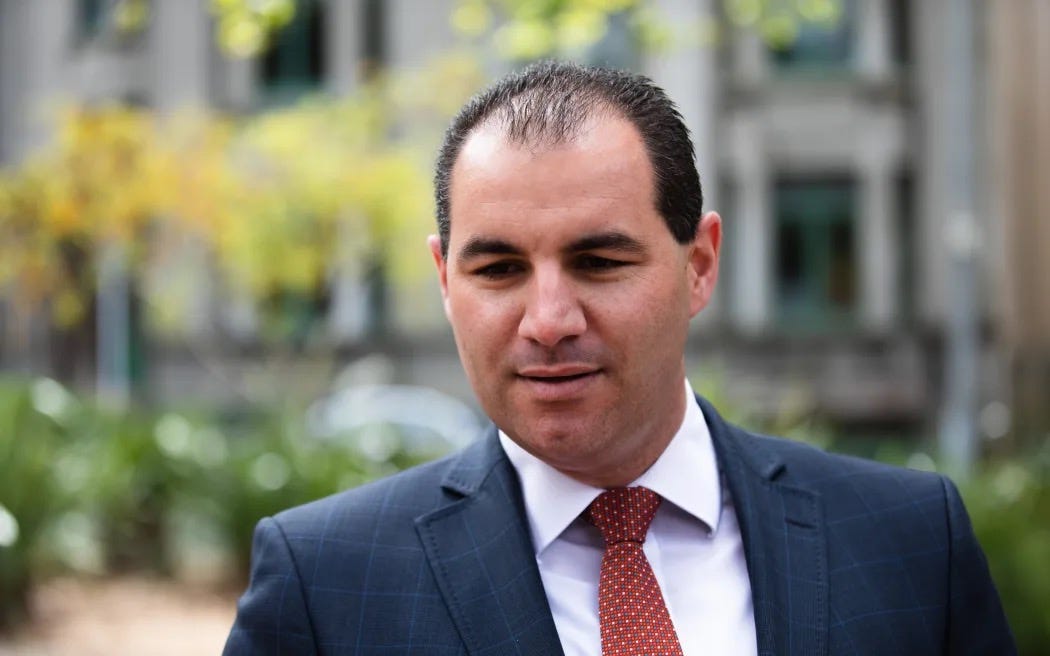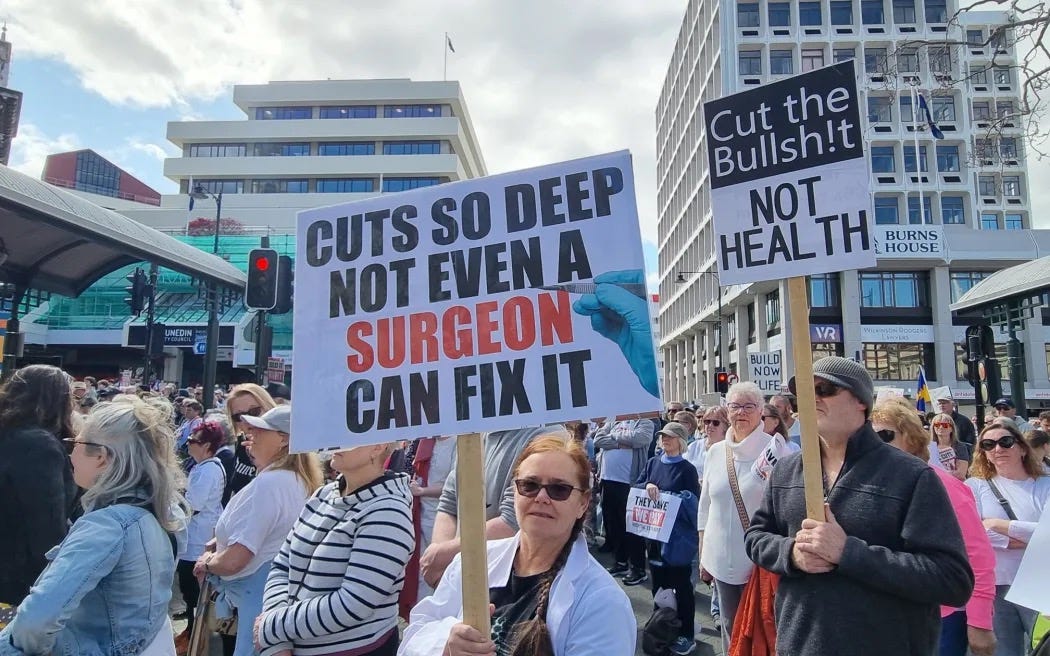Where is National’s care and concern for the South Island? Probably off having dinner with the CCP.
National has a representation issue.
Not in terms of gender, or race, or disability, or socio-economic background (though they do also have a lack of all of those), but with its representation for the South Island. Is it any surprise we’re the ones getting shafted when there’s only a single South Island politician in cabinet and he’s done nothing this year except get yelled at by Julie Anne Genter for not reading the reports pertaining to his own portfolio?
While diversity sounds like a modern buzzword, regional and local representation is the core principle on which our system of government was founded, both in England and here in New Zealand. It is therefore a massive oversight to be neglecting geographic representation, and can cause the sorts of decisions that make a QUARTER of a city show up to protest you.
And it’s not just that Luxon hasn’t picked the right people for his cabinet, it’s also that there just aren’t that many for him to pick from in the first place — or so I suspected, anyway. So like a good little political blogger, I took myself off to the Parliamentary website to count how many National South Island MPs there are (it’s 7 by the way. Plus Gerry Brownlee, who barely counts. So, 8. Out of 49 MPS).
And while I was scrolling, I spotted something weird. And that’s National‘s List MPs.
Nicola Willis. Mellissa Lee. Gerry Brownlee. And… Nancy Lu?
Who?
List MPs provide their parties a chance to balance their representatives without being disadvantaged by voter selection from electorates. They are often used to safeguard the places of experienced parliamentarians, or to give a showing to promising young candidates, or to provide representation for a particular community. Like, for example, the South Island, if you knew you were going to be short MPs from there. But ethnic communities are generally pretty high on the list of reasons to give an MP a second chance at a seat, or to lock one in for them. Given that, it’s not so odd that National chose to replace former MP Jian Yang with another Chinese New Zealander, Nancy Lu.
Until you remember why Jian Yang left. And until you read about how Lu got her spot.
It is rumoured (and by rumoured, I mean reported on by all of New Zealand’s major news outlets, investigated by the judiciary and prosecuted by the Crown) that former party leaders Jacinda Ardern and Todd Mueller agreed to remove both their Chinese list MPs after suspicions they were CCP spies. Both he and Raymond Huo left Parliament in 2020 in surprise departures. Yang has since admitted to training spices for the CCP.
The inquiry had heard allegations that the Chinese Communist Party (CCP) has sought to influence local body politics in New Zealand through an extensive network of community organisations funded by the Chinese government and its embassy in Wellington. Submitters allege influence extends from local body politics to community groups, to Chinese language media.
The accusations of CCP appointments track with Jamie Lee-Ross’s allegations around lobbying and bribes, in which influence is “bought” by Chinese donors who then subtly leverage their support to steer choices made by the party, including in the selection of MPs.
It is incredibly noteworthy, then, that Nancy Lu was groomed for her role by Jian Yang, according to Yang’s own admission — in secret, without the knowledge of the party.
National knows about that now, but it doesn’t seem to have made Lu any less of an asset in their eyes.
By all rights, she should have entered Parliament in 2020: at 26th on the party list, she was placed to. But the unprecedented defeat National suffered, giving New Zealand, and Labour, its first MMP majority government, put paid to that hope.
But only until the next election, when Lu jumped six places to 20th, putting her higher than some current cabinet members. She ran as a list-only candidate again, but her list seat was taken up by Andrew Bayley during the lead up to the Port Waikato by-election after the death of a candidate; it was only when he won the electorate and vacated his list seat that Lu finally entered Parliament.
It seemed she had been preparing for it in the time since her loss; in the interim, she took a job as a financial strategist at Auckland Council and secured herself a Masters qualification in public administration from Harvard. In the 2023 election, she focussed heavily on crime and National’s economic reputation, key interests for National’s supporters in the Chinese and wider Asian communities.
Lu credits her connection to the Chinese language and culture to her father, a current affairs commenter who described the Chinese national security law used to crush the Hong Kong pro-democracy protests as “necessary”. He stopped commenting right before his daughter’s announcement as list MP, and now only comments on Chinese television, including on state-owned channels which are controlled by the CCP.
Despite her background in accountancy, it seemed Lu too was unable to spot Willis’s gaping fiscal hole. On the trail, she dutifully recited the party line that only National can bring fiscal responsibility to government and claims the questionable promises made were “fully costed”, which in retrospect is obviously a lie. But that’s hardly surprising, I guess. What was she going to say? Nah, we can’t afford it?
So what’s with Lu?
National really, really wanted this candidate. They ran one other candidate of Chinese origin in the lady election, at a much lower list number of 42 and against incumbent Labour Minister Michael Wood, whose controversy over his failure to declare some of his of shares likely contributed to his loss of the Mt Roskill electorate. Cheung’s win over Wood (who is now Labour’s financial policy strategist) was described by the media as an ‘upset’.
A Hong-Kong born Kiwi, Cheung has no links to the CCP, unlike Lu, and has never worked in mainland China.
National List candidates are not determined by the party leader, but by the party. Labour’s attempt at a Chinese community representative replacement for Huo did not make it into Parliament. Obviously National were taking no such chances with their quite literal replacement for Yang — though even given that determination, Lu only just snuck in.
The criticism directed towards Luxon’s weak leadership in the face of two dominant minority parties masks a much bigger issue: National’s position is still exceptionally, historically weak. List slots have become more valuable than ever because there are less of them, and National would have been aware of this. The fate of their party is self-inflicted; the national party report found it was caused by poor leadership and backstabbing.
Another moment where Jamie Lee Ross emerges as a shining example.

Wood lost his spot to Cheung in Parliament because of controversy surrounding his conflicts of interest. Lu, on the other hand. was never given a chance by National to be shown in that light.
Ministers thought to be hiding shares don’t get in; wannabe-first-term MPs with links to the CCP who’ve been mentored by and are replacing an incumbent MP kicked from the party for being a Chinese spy definitely don’t get in. Not unless they’re catapulted up the list in a clear attempt to avoid public and media scrutiny of their background.
Which brings my all the way around to the answer of my original question: where are all the South Island MPs?
Booted down the list in favour of China. Gerry Brownlee is National’s only South Island list MP in Parliament, having lost the formerly-safe Ilam electorate due to not giving a toss about them or the city of Christchurch. He’s now Speaker of the House, where he’s continued his iconic attitude by not caring about fairness, convention, or the gains made in keeping lobbyists out of Parliament.
But of course he isn’t. The lobbyists are the ones paying for List spots.
Dunedin won’t get their hospital. Nor will Nelson. Christchurch’s mass shooting victims have been left without their promised wrap-around support. The entire island has been shafted in the roading budget, and will suffer the most the InterIslander project decision, which Luxon described as “wasteful and unnecessary”.
Maybe it seems unnecessary if you live in Auckland and are arrogant enough to think the North Island is self-sufficient. We in the South know better, and we know who will bear the biggest costs of these oversights.
It seems you have to be an independent state to be catered to by National. Perhaps this is finally the motivation we need to kick off South Island secession.








If you live in Auckland (where everything important happens and EVERYONE lives) the South Island is an irrelavency.
😱 We have a flag? 🧐 I'd be more impressed if had a seat in Parliament instead of a (possible) Chinese spy 🤬 because it would be more useful 🤷